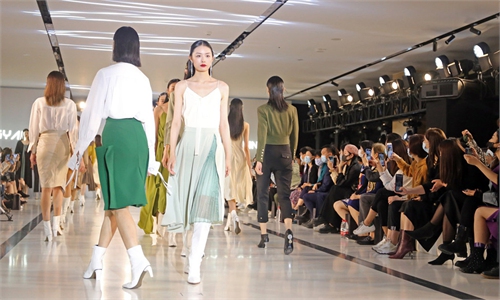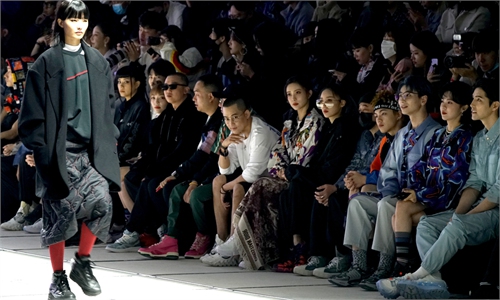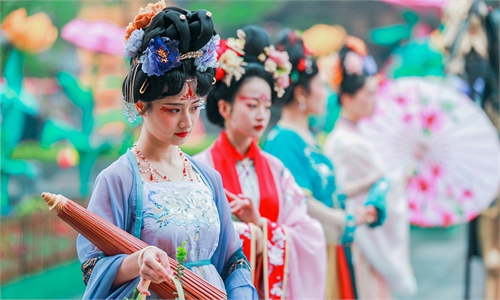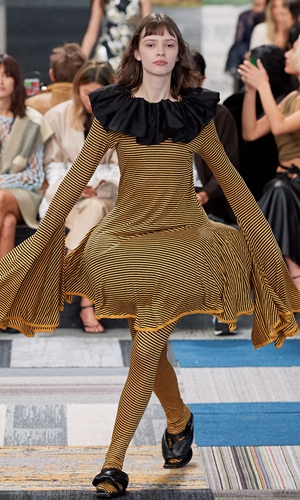
Models walk the runway at Australian Fashion Week 2021 on May 31. Photo: IC
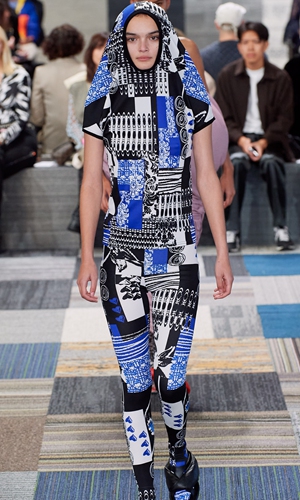
Models walk the runway at Australian Fashion Week 2021 on May 31. Photo: IC
The COVID-19 pandemic heavily changed the business landscape of many industries, and the fashion industry in Australia is no exception.However, the transformation of people's life and work style under the pandemic also means opportunities. The just-ended Australian Fashion Week (AAFW) in Sydney not only witnessed a successful return of one of the country's most important fashion events, but also showcased the shift in local brand designing and retail behavior after an involuntary hiatus.
Featuring the work of about 70 designers, the fashion week brought the fashion community back together after it was canceled in 2020. During a pivotal moment in history, the resilient market readjusted and repositioned artistic fundamentals of the industry to reinvention.
Ingrid Bonnor, founder of the Australian sleepwear brand Homebodii, told the Xinhua News Agency that she found more ideas for her design and greater profitability under the enforced lockdown, when people had to work from home for a long time.
Bonnor said orders doubled in 2020 since people are more concerned about their house dresses, and customers not only buy for themselves but also send them as gifts.
Bonnor also found that people are more likely to have casual and wearable clothes outside their homes. In order to meet their needs to look presentable and feel comfortable, she designed pajamas that could be worn outside for short-time casual work.
"We want our sleepwear to be more than pajamas, because when you factor cost per wear, you're getting more value out of the garment, and it is more comfortable and versatile now. You can wear it to bed, to the beach, to lunch."
2020 was also a potential period for Katya Komarova and her leather bags.
"It was a very difficult year, my brand was actually so inexperienced before, but it underwent a lot of development, because I was collaborating with other brands," Komarova told Xinhua.
The label has achieved its growth and driven transformation by cooperating with clothing brands, Morrison and Banded Together, creating more exclusive colors for her iconic leather bag designs. The rich tones of wine, chocolate and olive are in line with Komarova's aesthetic, proving to be ideal for its partners' creative direction and expanded its target demographics.
Komarova said the collaboration and support in the industry expanded her brand in the Australian market during the challenging period. She has debuted a new modernized and fresh version of their logo to reflect the brand's evolution over the past six years.
"It is a win-win solution," she said.
Meanwhile, the lockdown measures accelerated the shift from physical to online retail, and an increasing number of fashion brands or platforms are trying to create online experiences to provide similar levels of customer service as in-store.
"We used the body scanning to enable retailers to produce and send garments to fit that person," said Garo Iskenderian, general manager from Daniel Avakian.
"Customers just need to simply input their basic information and use a smartphone to scan their bodies, and that technology can enable us to produce garments, which has already been applied now."
Eric Berchtold, CEO of the Sydney-based brand the Iconic, said the functions of customization and personalization from artificial intelligent have also been used in the platform to help predict the consumers' size and preferences based on their purchase and return history, and the size they are in other brands.
"There are all sorts of other visualization tools that we use that you can actually just use with your own mobile phone. Have a look at what a different sneaker might look like on your phone, because that's actually something that people like to do in store," Berchtold said.
In response to the impression of Australia's fashion in 2021, most designers used the word "resilient."
Iskenderian said despite all the difficulties of the last nine months, there has been a "very strong and resilient growth" in the industry.
